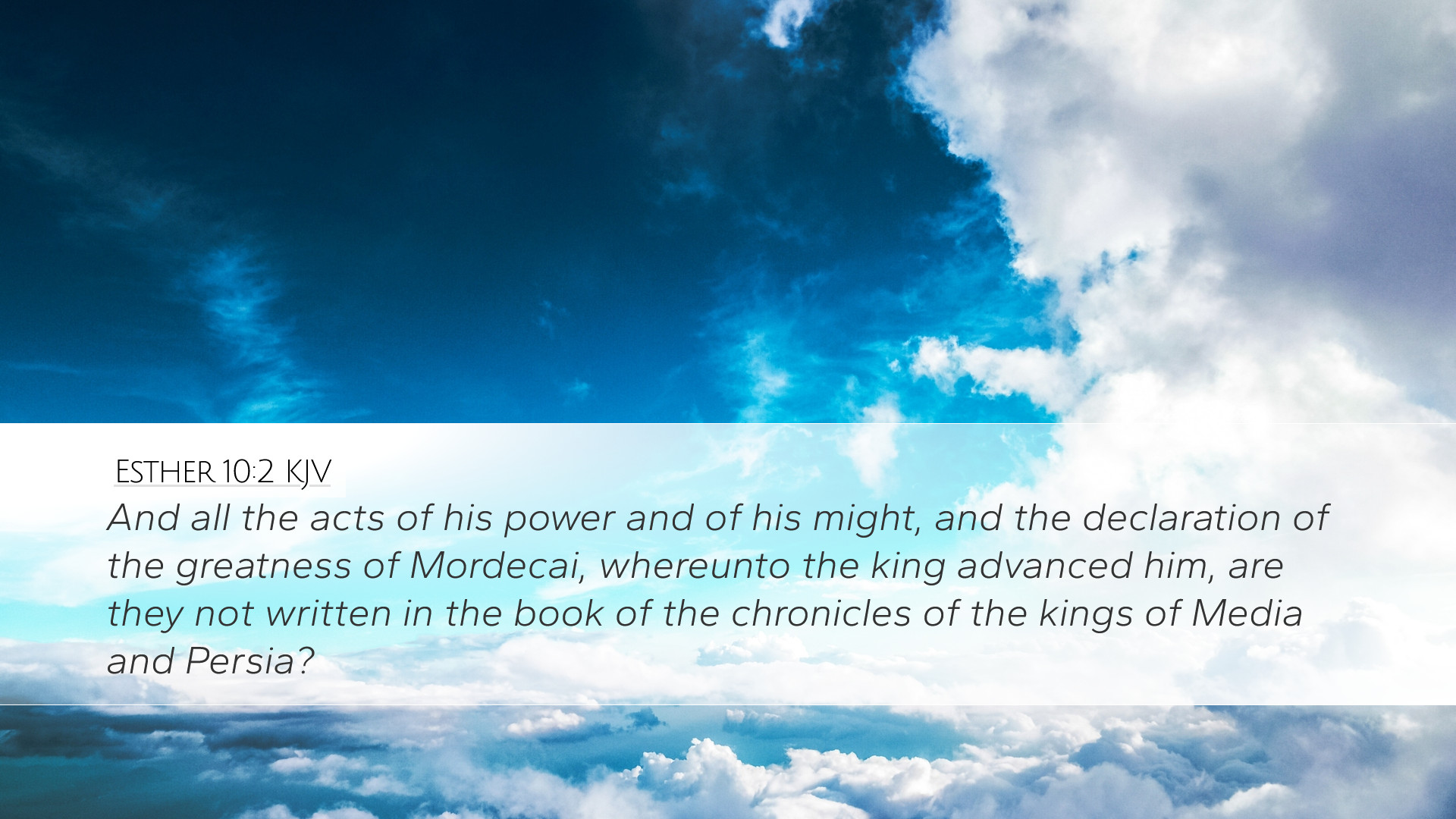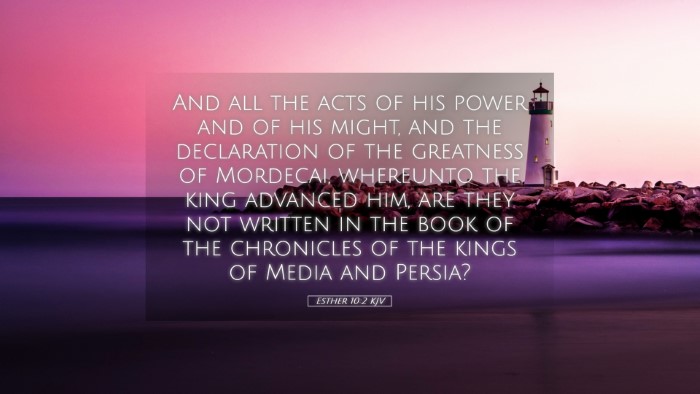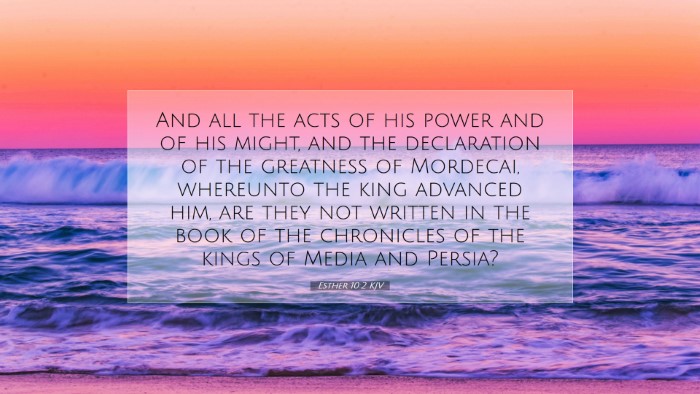Old Testament
Genesis Exodus Leviticus Numbers Deuteronomy Joshua Judges Ruth 1 Samuel 2 Samuel 1 Kings 2 Kings 1 Chronicles 2 Chronicles Ezra Nehemiah Esther Job Psalms Proverbs Ecclesiastes Song of Solomon Isaiah Jeremiah Lamentations Ezekiel Daniel Hosea Joel Amos Obadiah Jonah Micah Nahum Habakkuk Zephaniah Haggai Zechariah MalachiEsther 10:2
Esther 10:2 KJV
And all the acts of his power and of his might, and the declaration of the greatness of Mordecai, whereunto the king advanced him, are they not written in the book of the chronicles of the kings of Media and Persia?
Esther 10:2 Bible Commentary
Commentary on Esther 10:2
Verse Under Consideration: «And all the acts of his power and of his might, and the declaration of the greatness of Mordecai, wherein the king advanced him, are they not written in the book of the chronicles of the kings of Media and Persia?» (Esther 10:2)
Introduction
The Book of Esther concludes with a remarkable verse that encapsulates the themes of providence, honor, and the enduring legacy of righteous action. This commentary draws from the insights of notable public domain scholars such as Matthew Henry, Albert Barnes, and Adam Clarke, providing a comprehensive analysis of this pivotal scripture.
Context and Background
The narrative of Esther unfolds during the reign of King Ahasuerus, set against the backdrop of the Persian Empire. Mordecai’s rise from obscurity to prominence serves as a testament to divine providence and the theme of reversal, a common motif in Biblical literature. The mention of Mordecai’s deeds in the chronicles underlines the historical significance of his role in saving the Jewish people from annihilation.
Commentary Insights
This verse serves as a reflective closure to the Book of Esther, summarizing the king’s recognition of Mordecai. Each scholar emphasizes different facets of the verse:
-
Matthew Henry:
Henry highlights that the account of Mordecai’s greatness, noted in this verse, serves as evidence of God’s sovereignty. He reflects on how Mordecai’s faithfulness and integrity were rewarded in a foreign land, demonstrating that God’s providence is at work behind the scenes, even in the lives of the seemingly insignificant.
-
Albert Barnes:
Barnes enriches the commentary by drawing attention to the historian’s perspective, noting how the achievements of Mordecai were recorded not merely to honor him but to showcase God’s hand in the affairs of men. He asserts that the utterance about the king’s advancements of Mordecai highlights the importance of divine recognition as opposed to mere earthly accolades, teaching readers about humility and true greatness.
-
Adam Clarke:
Clarke’s exposition focuses on the “book of the chronicles,” a reference that emphasizes the permanence and importance of historical records in the Persian context. He elaborates that such records serve to remind future generations of God’s intervention in human events, strengthening the Jews' identity and faith through their shared heritage of divine deliverance.
Theological Implications
The overarching theological message of Esther 10:2 revolves around the themes of divine sovereignty and providence. Each commentary sheds light on how Mordecai's actions and the king's response reflect God's plan for His people:
- Divine Providence: Mordecai’s elevation is a clear reflection of God’s providence, where He orchestrates events for the protection and elevation of His chosen people.
- Legacy and Memory: The act of chronicling Mordecai’s successes serves as a potent reminder of the necessity to remember and celebrate the faithful of the past, which in turn strengthens and encourages present and future generations.
- Hope Amidst Trials: By concluding with a tribute to Mordecai’s might and power, the book reiterates hope and resilience in the face of adversity, proclaiming that the righteous will ultimately prevail.
Practical Applications
For pastors, students, and theologians, Esther 10:2 offers profound lessons:
- Encouragement to Faithfulness: Like Mordecai, believers are called to remain steadfast in their faith, trusting that God will honor their commitment in His perfect timing.
- Value of Historical Awareness: Understanding and teaching Biblical history can inspire faith and resilience, as believers see patterns of God’s faithfulness throughout history.
- Inspiration to Foster a Legacy: Creating a culture of remembrance within the church fosters an appreciation of God’s work through individuals, thus inspiring future generations to live faithfully.
Conclusion
Esther 10:2 invites reflection on both the personal and collective experiences of God's providential care. It encapsulates the journey from despair to deliverance, poignantly reminding readers of the importance of faithfulness, the recognition of God’s hand in history, and the call to remember and honor those who have walked in integrity. Ultimately, it challenges believers to leave a lasting legacy of faith that will continue to inspire and affirm God’s sovereignty across generations.


